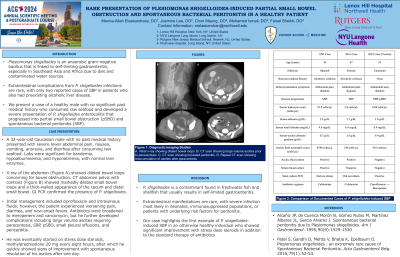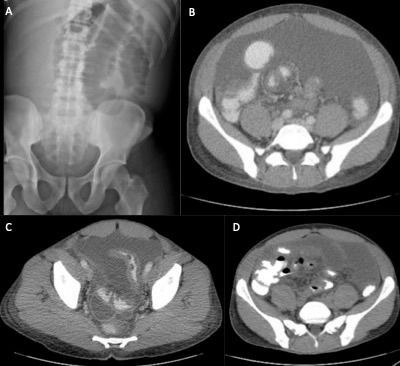Sunday Poster Session
Category: Small Intestine
P1583 - Rare Presentation of Plesiomonas Shigelloides-Induced Partial Small Bowel Obstruction and Spontaneous Bacterial Peritonitis in a Healthy Patient
Sunday, October 27, 2024
3:30 PM - 7:00 PM ET
Location: Exhibit Hall E

Has Audio

Menna-Allah Elaskandrany, DO
Lenox Hill Hospital, Northwell Health, NY
Presenting Author(s)
Award: Presidential Poster Award
Menna-Allah Elaskandrany, DO1, Jasmine Lee, DO2, Chun Maung, DO3, Mohamed Ismail, DO4, Faisal Sheikh, DO5
1Lenox Hill Hospital, Northwell Health, Astoria, NY; 2NYU Langone Health, New York, NY; 3NYU Langone Health, Mineola, NY; 4Rutgers New Jersey Medical School, Newark, NJ; 5Northwell Health, Plainview, NY
Introduction: Plesiomonas shigelloides is an anaerobic gram-negative bacillus that is linked to self-limiting gastroenteritis, especially in Southeast Asia and Africa due to diet and contaminated water sources. However, extraintestinal complications from P. shigelloides infections are rare, with only two reported cases of SBP in patients with preexisting alcoholic liver disease. We present a case of a healthy male with no significant past medical history who consumed raw seafood in the United States and developed a severe presentation of P. shigelloides enterocolitis that progressed into partial small bowel obstruction (pSBO) and spontaneous bacterial peritonitis (SBP).
Case Description/Methods: A 32-year-old Caucasian male presented with severe lower abdominal pain, nausea, vomiting, anorexia, and diarrhea after consuming raw seafood. His abdomen was diffusely tender and firm with hypoactive bowel sounds. His labs showed bandemia, hypoalbuminemia, hyponatremia, and normal liver enzymes. X-ray of the abdomen showed dilated bowel loops concerning for bowel obstruction. CT abdomen pelvis with contrast showed markedly dilated small bowel loops and a thick-walled appearance of the cecum and distal small bowel. Gastrointestinal polymerase chain reaction (GI PCR) confirmed the presence of P. shigelloides.
Initial management included ciprofloxacin and intravenous fluids; however, the patient experienced worsening pain, distention, and diarrhea as well as new-onset fevers. His antibiotic regimen was switched to meropenem and vancomycin, but he developed complications including large volume ascites requiring paracentesis, SBP, pSBO, small pleural effusions, and trace pericarditis. He was eventually started on stress dose steroids, methylprednisolone 20 mg every eight hours, after which he quickly showed signs of improvement with spontaneous resolution of his ascites after one day.
Discussion: P. shigelloides is a contaminant found in freshwater fish and shellfish that usually results in self-limited gastroenteritis. Extraintestinal manifestations are rare, with severe infection most likely in neonates, immunosuppressed populations, or patients with underlying risk factors for peritonitis. Our case highlights the first example of P. shigelloides-induced SBP in an otherwise healthy individual who showed significant improvement with stress dose steroids in addition to the standard therapy of antibiotics.

Note: The table for this abstract can be viewed in the ePoster Gallery section of the ACG 2024 ePoster Site or in The American Journal of Gastroenterology's abstract supplement issue, both of which will be available starting October 27, 2024.
Disclosures:
Menna-Allah Elaskandrany, DO1, Jasmine Lee, DO2, Chun Maung, DO3, Mohamed Ismail, DO4, Faisal Sheikh, DO5. P1583 - Rare Presentation of Plesiomonas Shigelloides-Induced Partial Small Bowel Obstruction and Spontaneous Bacterial Peritonitis in a Healthy Patient, ACG 2024 Annual Scientific Meeting Abstracts. Philadelphia, PA: American College of Gastroenterology.
Menna-Allah Elaskandrany, DO1, Jasmine Lee, DO2, Chun Maung, DO3, Mohamed Ismail, DO4, Faisal Sheikh, DO5
1Lenox Hill Hospital, Northwell Health, Astoria, NY; 2NYU Langone Health, New York, NY; 3NYU Langone Health, Mineola, NY; 4Rutgers New Jersey Medical School, Newark, NJ; 5Northwell Health, Plainview, NY
Introduction: Plesiomonas shigelloides is an anaerobic gram-negative bacillus that is linked to self-limiting gastroenteritis, especially in Southeast Asia and Africa due to diet and contaminated water sources. However, extraintestinal complications from P. shigelloides infections are rare, with only two reported cases of SBP in patients with preexisting alcoholic liver disease. We present a case of a healthy male with no significant past medical history who consumed raw seafood in the United States and developed a severe presentation of P. shigelloides enterocolitis that progressed into partial small bowel obstruction (pSBO) and spontaneous bacterial peritonitis (SBP).
Case Description/Methods: A 32-year-old Caucasian male presented with severe lower abdominal pain, nausea, vomiting, anorexia, and diarrhea after consuming raw seafood. His abdomen was diffusely tender and firm with hypoactive bowel sounds. His labs showed bandemia, hypoalbuminemia, hyponatremia, and normal liver enzymes. X-ray of the abdomen showed dilated bowel loops concerning for bowel obstruction. CT abdomen pelvis with contrast showed markedly dilated small bowel loops and a thick-walled appearance of the cecum and distal small bowel. Gastrointestinal polymerase chain reaction (GI PCR) confirmed the presence of P. shigelloides.
Initial management included ciprofloxacin and intravenous fluids; however, the patient experienced worsening pain, distention, and diarrhea as well as new-onset fevers. His antibiotic regimen was switched to meropenem and vancomycin, but he developed complications including large volume ascites requiring paracentesis, SBP, pSBO, small pleural effusions, and trace pericarditis. He was eventually started on stress dose steroids, methylprednisolone 20 mg every eight hours, after which he quickly showed signs of improvement with spontaneous resolution of his ascites after one day.
Discussion: P. shigelloides is a contaminant found in freshwater fish and shellfish that usually results in self-limited gastroenteritis. Extraintestinal manifestations are rare, with severe infection most likely in neonates, immunosuppressed populations, or patients with underlying risk factors for peritonitis. Our case highlights the first example of P. shigelloides-induced SBP in an otherwise healthy individual who showed significant improvement with stress dose steroids in addition to the standard therapy of antibiotics.

Figure: A. Initial x-ray showing dilated bowel loops. B. CT scan showing large volume ascites prior to paracentesis. C. CT scan showing loculated peritonitis. D. Repeat CT scan showing reaccumulation of ascites after paracentesis.
Note: The table for this abstract can be viewed in the ePoster Gallery section of the ACG 2024 ePoster Site or in The American Journal of Gastroenterology's abstract supplement issue, both of which will be available starting October 27, 2024.
Disclosures:
Menna-Allah Elaskandrany indicated no relevant financial relationships.
Jasmine Lee indicated no relevant financial relationships.
Chun Maung indicated no relevant financial relationships.
Mohamed Ismail indicated no relevant financial relationships.
Faisal Sheikh indicated no relevant financial relationships.
Menna-Allah Elaskandrany, DO1, Jasmine Lee, DO2, Chun Maung, DO3, Mohamed Ismail, DO4, Faisal Sheikh, DO5. P1583 - Rare Presentation of Plesiomonas Shigelloides-Induced Partial Small Bowel Obstruction and Spontaneous Bacterial Peritonitis in a Healthy Patient, ACG 2024 Annual Scientific Meeting Abstracts. Philadelphia, PA: American College of Gastroenterology.


